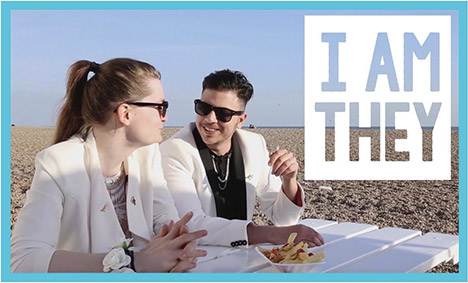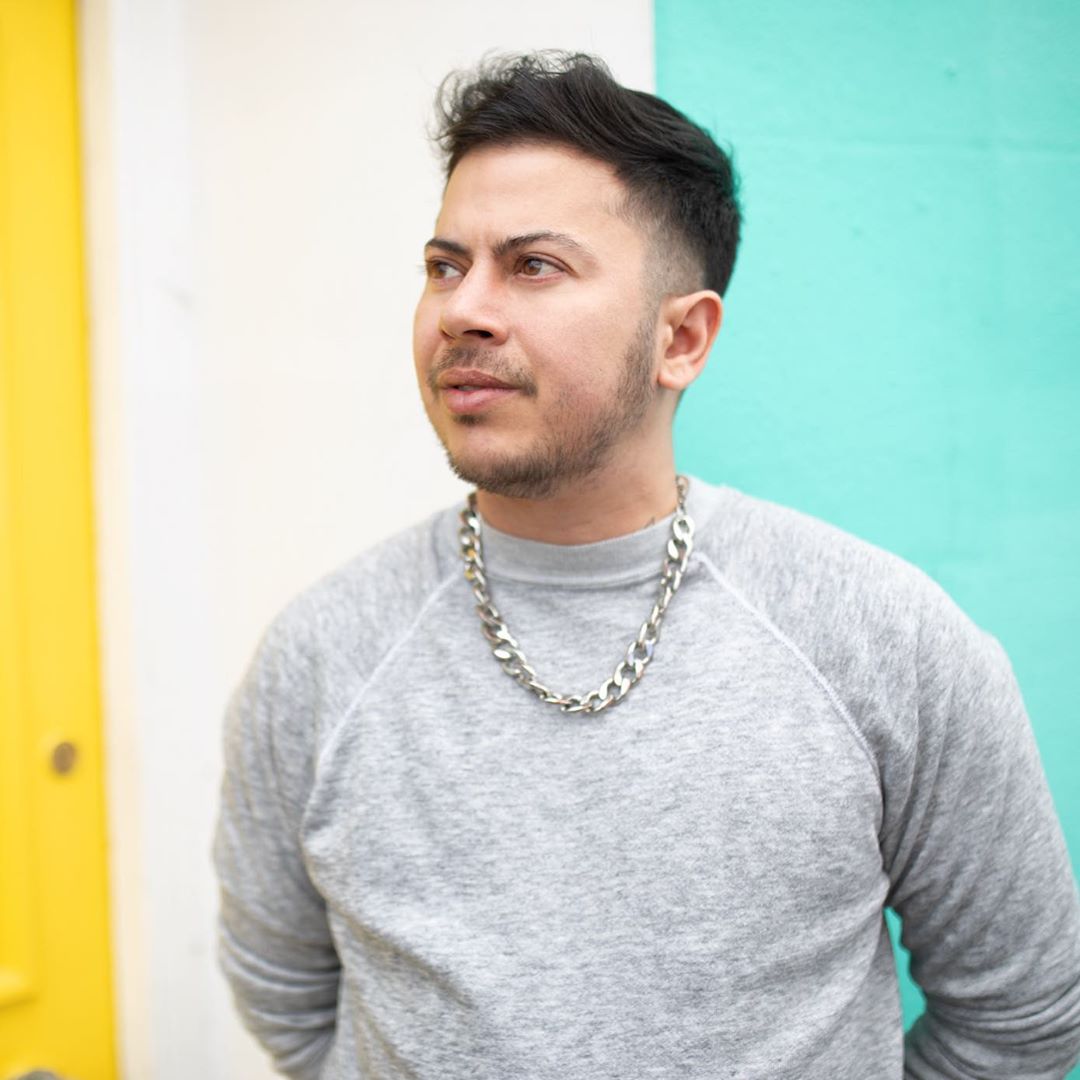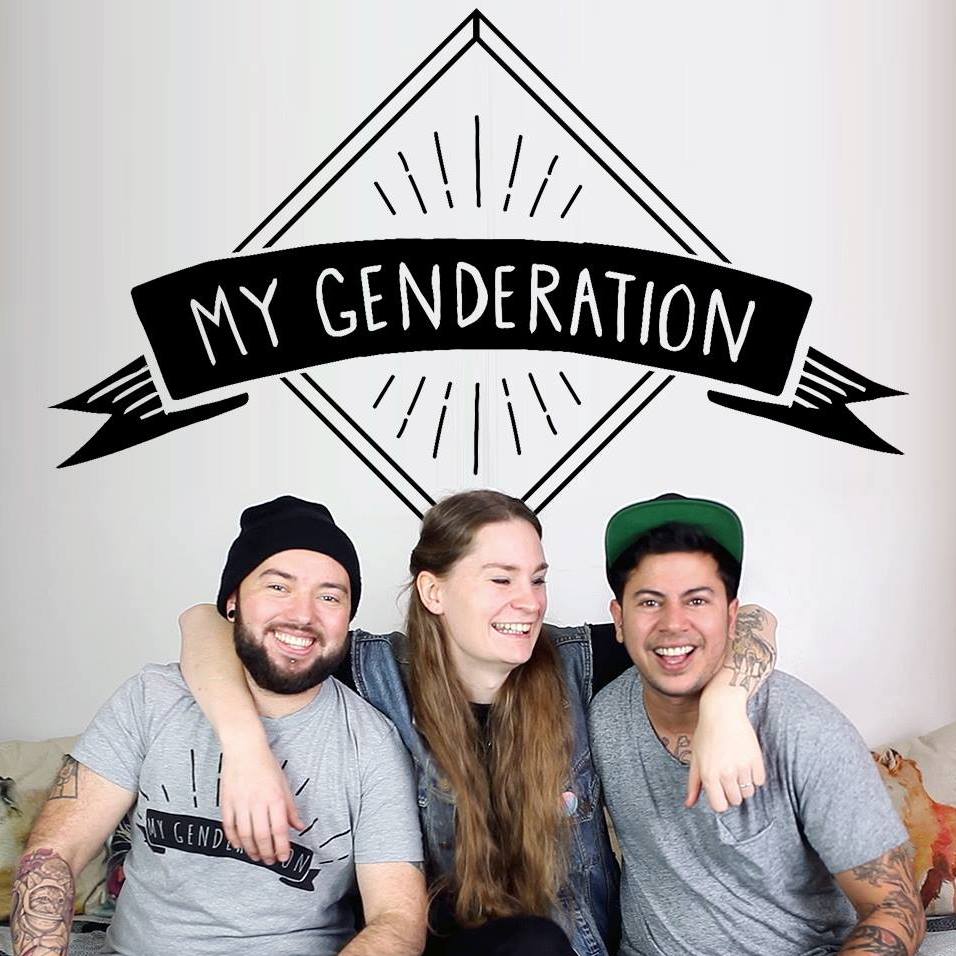I Am They is the non-binary representation we’ve been waiting for

Owl and Fox Fisher. (MyGenderation)
Openly non-binary people aren’t often seen in films.
In fact, when it was announced this year that Asia Kate Dillon – a non-binary actor – would be playing a non-binary character in John Wick 3, it was one of the first times we’d had that kind of representation onscreen.
But a new documentary is about to change that. Made by transgender activists Fox and Owl Fisher, I Am They takes us through non-binary trans issues from the personal perspectives of the filmmakers, with lots of representation of lots of non-binary people.
Director Fox Fisher spoke to PinkNews about making the film.
Let’s start at the beginning. When and how did the idea for I Am They come about, and when did you begin filming?
There was next to no content about non-binary people out there. So, since we didn’t see ourselves represented, we decided to create the content ourselves.
We set out to explore our own stories as non-binary people and the challenges we and other people face for being non-binary.
The documentary focuses on legal gender recognition, as non-binary people currently aren’t recognised legally in the UK. So we used the idea of marriage as a gimmick, because you have to be registered male or female on the certificate.
People are craving more conversations and representation.
Marriage is often something a lot of people feel strongly about and it’s a sign of love and commitment in our culture, so we wanted to appeal to the mainstream and show them that even such a simple thing as getting married isn’t possible, legally, for non-binary people without compromise, despite all the talk about marriage equality. It raises awareness of the wider issues and lack of legal gender recognition and the effects it can have on people’s lives.
We began filming in March 2016 with a film crew, so it’s been a long time in the making. We ended up replacing a lot of the scenes we filmed with the crew as we felt that it wasn’t quite what we wanted to create and we wanted a slightly different focus, and there were also some issues with the filming from their side. So most of the film is scenes that we recorded ourselves, weaved in with a few scenes from the original filming.
The film is therefore a collection of different scenes between 2016-2019.

Fox Fisher. (Instagram/@thefoxfisher)
I Am They is one of the first feature-length documentaries focusing on non-binary trans issues, which is especially amazing given that it’s still rare to see an openly non-binary character in any film. Does it feel to you like mainstream society is ready to see non-binary people on their screens?
Definitely. I think that non-binary issues are often represented as this huge complicated issue that your average person would be unable to understand, but we think people are a lot more able to take in the concept of non-binary people than they are given credit for.
We as a society are having more open conversations about gender diversity and we don’t think they’re only ready, but people are craving more conversations and representation to be able to wrap their heads around it, and for non-binary people to feel represented and have references of people like them in popular media.
What other issues came up during filming that you’ve seen improve for non-binary people since?
The lack of language around non-binary identities and gender diversity was a topic that came up again and again with the people we spoke to, in all different parts of the world.
It seems that most language is so binary in the way that it’s structured, which means that non-binary people lack the words to describe their identities properly, forcing us to define ourselves based on what we’re not as opposed to what we are.
No one makes room for us and we constantly have to try and make our own space.
When we talk about non-binary people it’s usually described as not being exclusively a man or a woman, as opposed to just being described as an identity on it’s own.
It just goes to show how our understanding and construction of language has never been inclusive of this diversity and we really need to expand our language to encompass all identities and expressions in their own right, rather than a lack of.
Because non-binary people aren’t lacking anything, and we aren’t all “gender-neutral” – if anything, we are gender-everything, with such a wide range of expressions, identities and ways of being.
We haven’t met, but I’ve followed you and your partner Owl avidly on social media for the past couple of years. The weirdness of that and the arguably problematic nature of social media aside, being able to see two non-binary people living their lives was hugely impactful for my own coming out. I spend a lot of time thinking about visibility as a result of that.
I Am They is a film about you and Owl, and I bet a lot of the people watching will be trans or questioning their gender. Did you have an intended audience in mind while making the film?
When we created it, we first and foremost wanted it to be educational film for everyone, but also a story that non-binary people could see themselves reflected in. That’s why we interviewed a lot of other non-binary people as a part of the film, to get at least a glimpse into the depth of the non-binary community.
The whole idea of being non-binary means that we fall outside of this binary.
So the audience was a bit of a mix of both, but we really wanted to reach those people that are maybe a bit confused, unsure and want to know more. So our audience, like with most things we do, consists of a very wide range of people. We think the film explores the topic quite gently and in an informative way, so we really hope that people that want to know more will find it helpful, and also that non-binary people see themselves reflected in our story and the stories of other people.
I Am They is informative, but it’s also a love story. What’s it like to work alongside your partner, on I Am They and on wider non-binary activism issues?
I never thought I’d find someone that I could work with and be in a relationship with, or even thought that was something I always wanted. It’s been such a relief to find someone like Owl who understands and has the same passion for this type of work as I do and I couldn’t imagine it another way now.
There is a level of understanding that otherwise wouldn’t be there, and the fact that we are both trans makes the relationship even more special and unique. Of course we work on our separate things, but it’s great that our core work is mostly done together and we match really well in what we do.

I Am They is a film from My Genderation, made up of Lewis Hancox (left), Fox and Owl (centre).
You’re releasing I Am They on International Non-Binary People’s Day. I read that the date chosen for this day of awareness was July 14 because it falls exactly between International Women’s Day and International Men’s Day… this idea of non-binary people’s genders falling in the “middle” of man and woman doesn’t fit or feel right for me, and I wondered how it feels for you and whether you have any thoughts on how the date was chosen?
I definitely think that this idea that non-binary is something in the middle doesn’t encompass everyone’s experience of being non-binary, as being non-binary can mean so many things and doesn’t necessarily have to be tied to these binary categories.
For me, the whole idea of being non-binary means that we fall outside of this binary, so I share your frustration with the interpretation that it’s somewhere in between.
It’s a very simplistic way to see it, so I suppose I see where it comes from, even though I don’t share that particular experience of being non-binary myself.
I think we should be more critical and be trying to expand the idea of gender, instead of constantly confining ourselves within the binary in one way or the other.
What do you think the most important issues facing non-binary people are today in the UK?
That’s a big question that I think is very difficult to answer. It’s hard for me to say, as I can only speak from my own experience and I know that non-binary people as a group are so different, with different needs and different experiences.
There are definitely many issues that need addressing, such as the complete lack of legal gender recognition and our inclusion in most aspects of society.
No one makes room for us and we constantly have to try and make our own space, as the UK is so inherently binary in it’s language, structure and entire society.
There are also massive hurdles when it comes down to access to healthcare and other services, and I think we as a country need to be having conversations about how to make sure non-binary people are included in services, especially since they are often inherently gendered.
But I definitely think that the media plays a huge part in making all these problems even worse.
One of our biggest problems is overcoming this outrage and overcoming all the fear-mongering.
The media continues to peddle all sorts of misinformation about us and I think that we as a country really need to address the role of our media, and the way the British press has often hindered social progress for minorities, and capitalises off of misinformation and outrage about certain issues.
It certainly has on trans issues, and part of the reason why the UK is so horrendous towards trans people is because the media facilities a culture war on these issues, instead of addressing them with evidence-based discussions.
I therefore think that one of our biggest problems is overcoming this outrage and overcoming all the fear-mongering that’s out there. And this can only be done by educating people, and having these issues talked about in places of education, where people can learn about these issues and know that there is nothing to fear.
Non-binary people are not here to erase anyone’s identity. On the contrary, it’s more about wanting everyone to be able to be themselves and to be respected for it.
Watch I Am They here and follow Fox on Instagram here.

